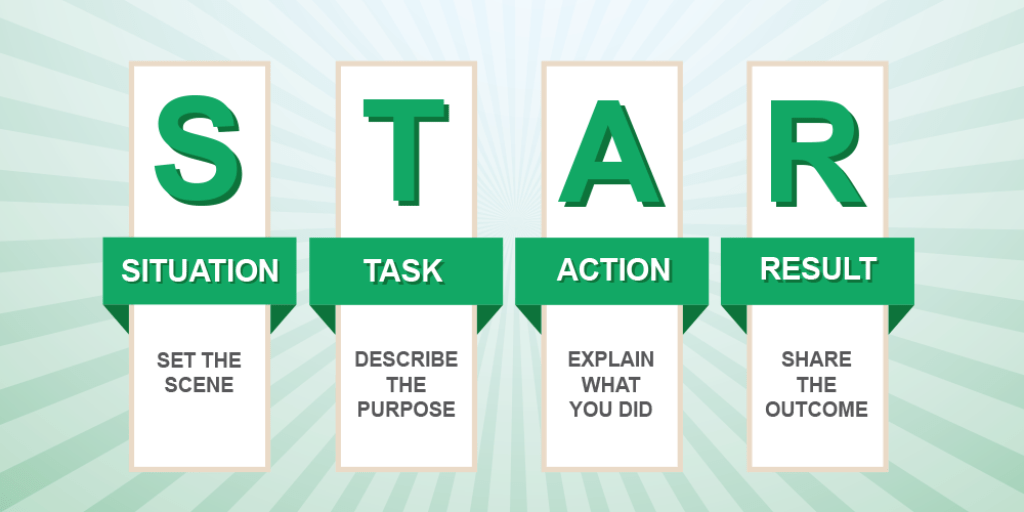If you struggle to get your point across in interviews, you’re not alone. There’s something about the interview setting that can make even the most eloquent speaker go blank. If you’re unsure how to share your accomplishments or if you find yourself leaving an interview wishing you had said so much more, this article is for you. In many cases, you just need to work on your interview technique.
The STAR method is one kind of response technique which could really help you. It will help you to organise your answers and make sure you put your point across in a concise manner. STAR stands for Situation, Task, Action and Result. By using this structure, you can answer many different competency-based questions. These types of questions usually start with “can you tell me about a time when…”
If you’re ready to put the STAR technique to work in your next interview, read on to discover how to make the most of it.
What is the STAR interview response method?
If you are expecting to face behavioural interview questions, then the STAR method can help. The STAR method is a way of structuring your answers to make sure you fully answer the question.
Behavioural interview questions are questions that are used to find out how you have behaved in the past. They are most often used by employers to assess how you respond to situations, how you reflect on your personal skills, and what skills you possess. This type of question can be very revealing, so it’s helpful to have a structure to your answers.
Some examples of behavioural questions in an interview might include:
-
Tell me about a time when an event supplier let you down and what you did you fix the situation.
-
What have you done in the past when a member of your team wasn’t pulling their weight?
-
In what situations have you gone above and beyond to get the job done?
Some interviewers will structure their interview so that it follows the STAR method. Others will simply ask broad situational questions, and you will be required to structure your answer. This is why practising your answers in this way can help you to be prepared for anything.
If you want to make sure you are giving comprehensive answers and not leaving out any key points, you should learn and follow the STAR method. As outlined above, it is made up of four key concepts. The concepts are as follows:
Situation: Describe the context of the scenario you are outlining. Assume that the interviewer has no prior knowledge. For example, don’t assume that they know how many people you had on your team. Don’t assume that they know timeframes. In event interviews, you will most likely be facing questions about the events you have been involved with in the past. Give a brief overview of the event, industry, time frame, and who you had working above you and below you.
Task: Now is the time to get into specifics. What was your responsibility in the situation? Where did your role sit in the grand scheme of things? Perhaps you had to solve a problem with a supplier on the fly, deal with difficult volunteers, or resolve a conflict in the workplace.
Action: You’ve set the scene, so you can start to outline the steps you took in the situation. Don’t talk about the actions taken by the whole team, and never mention “we”. Always talk about your contribution and how you helped to resolve the issue at hand.
Result: Once you have outlined your contribution, give an overview of how it turned out. If possible, get specific. Remember, it doesn’t always have to be a positive outcome. Often, acknowledging what you learned from a situation can help to demonstrate your self-awareness and willingness to learn.
How to prepare this type of answer
You might be thinking: this all sounds great, but how do I know what they are going to ask me? In reality, you don’t. But you can still prepare anyway.
Start with the job description for the role. Make a list of the key skills and competencies they are asking for in this role. Next, look at your own documents and make a list of the skills and experiences you have mentioned on your CV, cover letter and portfolio.
Now, match these skills and competencies to scenarios from your career. For example, if you say on your CV that you have strong communication skills, think about a specific scenario where this has helped you to do your job.
By having a few different scenarios ready to go, you won’t be left flustered in the interview trying to recall an obscure situation. You’ll be ready to outline the situation and show your competency.
Examples of questions and answers using the STAR method
Example 1: Can you tell me about a time when you had to deliver an event on a tight deadline?
Answer: While I normally prefer to take a methodical approach to event planning, I’m also very confident working to a tight deadline. In my current role, I was asked to step in after a colleague left his role without warning. I was able to pick up where he left off and delegated the work between the team. We managed to deliver the event on time, and it even came in under budget, which was a nice surprise.
Example 2: How do you deal with conflicts between colleagues?
Answer: In a previous role, I was working in a team where two colleagues were refusing to work together. I’m a natural communicator, so I used my skills to call a team meeting so that we could get to the bottom of the issues. The conflict was the result of miscommunication around workloads. We decided to reshuffle the work between us to make the workload fairer. This resulted in increased productivity on our team, and the event we were working on came together beautifully.
Example 3: Can you explain a situation where you were required to go above and beyond for your job?
Answer: Going above and beyond is all part of the job for me. I wouldn’t be satisfied to only do the minimum requirements in any role. I recently worked on an event with a small team of three people. I recognised that one of my colleagues was struggling with his workload due to family commitments. My own work relied on his work being completed on time, so to leave him to struggle would mean my own work would suffer. I approached him discreetly one lunchtime and offered my help. We both stayed in the office late that night to help get his portion of the planning on track so that the event could stay on schedule. He was able to deal with his personal commitments, and our work didn’t suffer as a result, so I was delighted with the outcome.
Interview preparation is just one of the services we offer our candidates. As the UK’s leading specialist event recruitment agency, we know a thing or two about events interviews. If you’re ready to take your career to the next level, whether you are based in Birmingham, Manchester or Leeds, get in touch with our team today.



